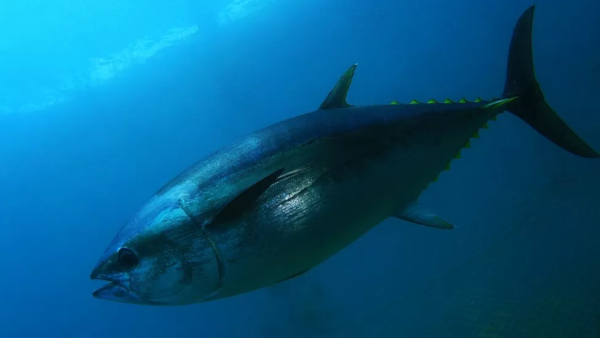A giant 900lb (408kg) tuna believed to be the biggest fish ever caught in Welsh waters has been landed by an angler. Simon Batey and friend Jason Nott caught the Atlantic bluefin tuna off the Pembrokeshire coast.
The huge 9ft (2.82m) fish was caught, measured and then released. Campaigners said Welsh waters now boast some of the biggest fish in the world and want a fishery established to attract international anglers. (photo: Getty Images)
Mr Batey, from Bridgend, landed the tuna while returning from fishing in an area of the Irish Sea known as the Celtic Deeps, approximately 30 miles off the west Wales coast.
During the hour-long struggle, he passed the rod to Mr Nott, from Rhondda Cynon Taf, while working with skipper Andrew Alsop.
It was measured from the nose to the fork of the tail while a globally recognised formula then gives an approximate weight.
“By far it’s the biggest fish caught in Welsh waters. The previous biggest was around 600lbs,” said Julian Lewis Jones, patron of Angling Cymru.
The fish was brought alongside the boat to be measured and then towed to ensure a regular supply of oxygen to the gills before being released.
“It’s very exciting that a fish of this size has been caught in Welsh waters. We now have some of the biggest tuna in the world swimming in our waters,” he added.
Mr Alsop, of Rhoose, Vale of Glamorgan, captains one of only six boats in Wales licensed under the new tuna catch and release tagging (Chart) scheme.
Julian Lewis Jones said there was the potential for a “world-class” recreational catch and release tuna fishery in Wales.
He added: “As fishermen we are guardians of the marine habitat and have a passion for conservation and the environment. We have been working with researchers at Swansea University because we want marine life to thrive. A catch and drop fishery could be managed, sustainable and bringing socio-economic benefits to the area.”
Famed for their size and speed in the water, the Atlantic bluefin tuna, also known as the giant bluefin tuna, disappeared from UK waters during the 1960s due to commercial overfishing and a changing climate.
But they have been spotted feeding in large numbers over the past decade between the months of July and December.
This story can be read on the BBC website, the Mirror and WalesOnline.
